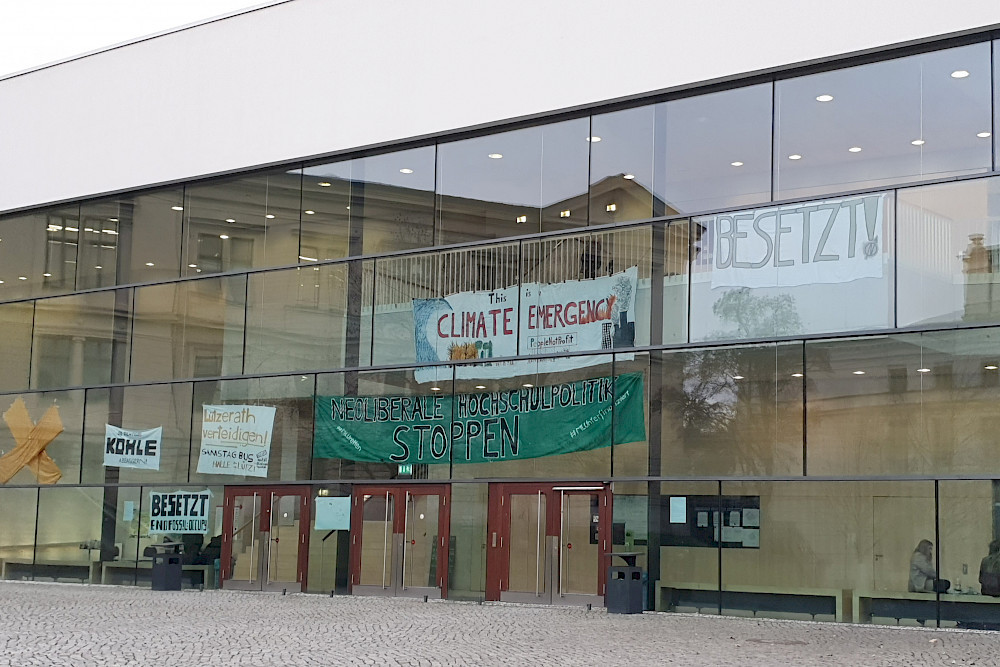Sustainability in research: an initial overview

It was late afternoon on 13 January 2023 when the university published a special paper summarising the results of the successful negotiations between the Rector’s Office and students from “End Fossil: Occupy! Halle”, a group that campaigns for climate justice. The publication brought an end to the activists’ occupation of the largest lecture theatre at the university. They had occupied the room for almost five days. Both parties agreed to create more transparency, including a project that the MLU had already been working on in the months leading up to the occupation: a sustainability research atlas.
Professor Michael Stipp, a geoscientist who has been the Rectorate's Sustainability Officer since 2019, attended the first meeting with the students in January. “We were able to get across the fact that a lot is already being done in research”, he says. They also highlighted various aspects of the university’s teaching and general operations that meet sustainability guidelines, such as the supply of 100 percent green electricity and the recycling project on the Heide-Süd Campus. “That definitely helped our discussions”, says Stipp.
Professor Stipp was also in charge of setting up the Sustainability Office with coordinator Frederik Bub in 2020. The research atlas was one of the office’s first assignments when it came to developing a sustainability strategy for the entire university. In order to analyse the current situation, they first evaluated the Research Portal of Saxony-Anhalt using a list of keywords, explains Frederik Bub. The portal contains numerous research projects and publications from all over the federal state. As the research portal database is incomplete, however, they also ran a search on the websites of each chair at the university – and this information was then supplemented by research projects and publications from individual departments. A total of 456 sustainability-related projects have been identified so far (as of the end of April). The projects are either still ongoing or have just been completed. The atlas is by no means finished – it will be continuously updated and expanded. So submissions are always welcome, says Bub.
The projects included in the atlas were selected on the basis of the 17 Sustainable Development Goals (SDGs), which the United Nations adopted in 2015 as part of “Agenda 2030”. The SDGs cover much more than just climate action and clean energy. The eradication of poverty and hunger also plays a role, as does, for example, quality education, good health and well-being, reduced inequalities, sustainable consumption, and decent work and economic growth. “All 17 goals are important – and necessary. For example, we’ll only be able to fight climate change together as a global community if everyone has a good education and doesn’t suffer poverty or hunger”, says Stipp.
There was a key question for the MLU research atlas: When it comes to health, for example, should everything that happens in university medicine be seen as sustainability research? In such cases, the team focused on projects that reflected more than one of the 17 SDGs, explains Bub. In medicine, for example, that would be the connection between health and migration or health and reduced inequalities, as is the case in projects run by the “Global Health” working group. Based on these criteria, a database has now been created that shows how broad the spectrum is at the university. It contains projects from all faculties, such as biodiversity and energy research in the Faculty of Natural Sciences, business ethics in the Faculty of Law, Economics and Business, renewable energy acceptance research and questions of educational equity in the Faculties of Philosophy, and a project on the topic of fair trade in Theology. “I was surprised by the sheer range of projects”, says Stipp.
All 17 SDGs are being researched at the MLU. Most of the projects can be assigned to the categories of “Life on Land”, followed by “Reduced Inequalities”, “Climate Action”, “Health and Well-Being” and “Quality Education”. And while certain faculties focus more on specific areas, as you might expect, some topics are being researched within scientific and philosophical disciplines (e.g. hunger, energy and climate).
The research atlas not only creates transparency and helps to advertise the university to the outside world, says Stipp. It also increases visibility within the university, resulting in new cooperation opportunities for interdisciplinary and transdisciplinary research. According to Frederik Bub, who is coordinating the project, the research atlas could also inspire a series of events on individual sustainability goals, where researchers would offer insights into their work and the challenges they are facing.
Professor Michael Stipp
Institute of Geosciences and Geography
Tel. +49 345 55-26150
Mail michael.stipp@geo.uni-halle.de
Frederik Bub
Sustainability Office
Tel. +49 345 55-25596
Mail frederik.bub@rektorat.unihalle.de
